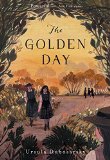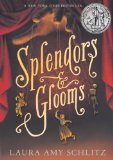Summary | Excerpt | Reading Guide | Reviews | Beyond the book | Read-Alikes | Genres & Themes | Author Bio

Feeling separate is a universal experience. Too often these days, we live behind picket fences, or
triple-locked doors. We live behind stone walls or lines in the sand. We live behind fear or
worry. The Magician’s Elephant by Kate DiCamillo is a story about people who break through these barriers - a story brimming with connection and the hope, love and, yes, even magic that comes from those connections. On the one hand it's a magical, faraway fable, and on the other hand a very present and real story, both woven together (dare I say connected together?) in the seamless way that can only come from Kate DiCamillo. Loss, love, and hope are recurring themes in her work - think
Because of Winn-Dixie,
The Tiger Rising, and
The Miraculous Journey of Edward Tulane, to name just a few - and in all of them she displays her knack for entwining real and believable characters with a bit of magic.
In The Magician’s Elephant, Peter Augustus Duchene is a boy alone. He lives with Vilna Lutz, a soldier friend of his father's, but his family is gone. His father is dead. His mother is dead. His sister, Adele, is - dead? That's what Vilna Lutz has told him. But Peter visits a fortuneteller who leads him to question the truths he's accepted. And she tells him that an elephant will guide him toward his true destiny.
An elephant? Impossible.
Or maybe not.
What if this is true? Could it possibly be true? These questions percolate in Peter's head and heart. By opening his whole self to these possibilities, a space is created - inside and outside - for the answers to come. He hears about an elephant who has been conjured out of thin air by a magician, and he begins to believe. Then he finds out that the elephant is being held right in his town. Finally Peter's wondering and believing becomes action. He helps the elephant find her home and in the process he moves closer to his own home.
Kate DiCamillo creates an ensemble cast, with Peter and the elephant at the center. Everyone - from the local beggar, to the man who cleans up after the elephant, to the policeman who lives below Peter, to the nun who runs the orphanage - suffers in the same way. They are all not quite where they belong, not quite living whole, fulfilling lives.
For change to come, they must all choose - as Peter has - to open themselves up to questions. As Leo Matienne, the policeman says, "We must ask ourselves [these] questions as often as we dare. How will the world change if we do not question it?" This, in and of itself, is a worthy theme. Asking questions and believing in the possibility of. But the entire cast of characters discovers that they cannot choose to open themselves up to questions and possibilities alone. Separately they don't have the imagination, or the courage or, most importantly, the openness to the present moment necessary for such an endeavor. This is where Kate DiCamillo's brilliant craftwork shines through, and her themes elevate from simply worthy to breathtaking.
In the stunning penultimate scene, Peter, intent on getting the elephant back to her home, walks with her on a snowy night, along with all of the others. They are focused on the task at hand, putting one foot in front of the other as snow falls gently on their heads. And miraculously, while deeply immersed in the process of getting the elephant back home, Peter finds what he wants most. "It's the impossible… The impossible has happened again." In this transformative moment, everyone finds what they want most. Or, perhaps more accurately, they are found by their deepest desires.
This is the magic of Kate DiCamillo's story - articulating the idea that in choosing to open yourself up to questions and possibilities and fully giving yourself over to something real and present and physical, you allow your deepest desires to come to you. This is the magic to really living, don’t you think?
On the process of writing The Magician’s Elephant, Kate DiCamillo says:
"I started writing [a magician's] story down, and I discovered that in addition to the magician, there was a boy named Peter, a girl named Adele, an elephant (of course), a policeman, magic, wonder, snow, hope, song. I had just come through one of the most difficult winters of my life, and as I wrote, I realized that I was resting the whole of my heart on the story, that all my sadness, all my despair, all my hope and love, was going into the telling of the tale. I was struck anew with the power of story, how it gives us a way to understand ourselves, our hearts, our world - how it can work to put things back together again. It is my outrageous wish that you, as you read this story, will find some of the comfort and hope and magic, some of the healing power, that I found in the telling of it."
Having just come through one of the most difficult winters of my own life, I can absolutely say that this book did just that for me. It brought me comfort and hope and, yes, magic. I can't help but think that The Magician's Elephant has the potential to do the same for anyone who reads it.
This book is well suited for middle grade and young adult readers, although I do think that younger children would enjoy it too, perhaps having it read to them by an adult.
![]() This review was originally published in The BookBrowse Review in September 2009, and has been updated for the
April 2011 edition.
Click here to go to this issue.
This review was originally published in The BookBrowse Review in September 2009, and has been updated for the
April 2011 edition.
Click here to go to this issue.

If you liked The Magician's Elephant, try these:

by Ursula Dubosarsky
Published 2015
When their teacher goes missing during an outing, eleven girls grapple with the aftermath in this haunting, exquisitely told psychological mystery.

by Laura A. Schlitz
Published 2014
Newbery Medal winner Laura Amy Schlitz's Victorian brings her sorcery to a Victorian gothic thriller -- an enthralling, darkly comic tale that would do Dickens proud.
Your guide toexceptional books
BookBrowse seeks out and recommends the best in contemporary fiction and nonfiction—books that not only engage and entertain but also deepen our understanding of ourselves and the world around us.